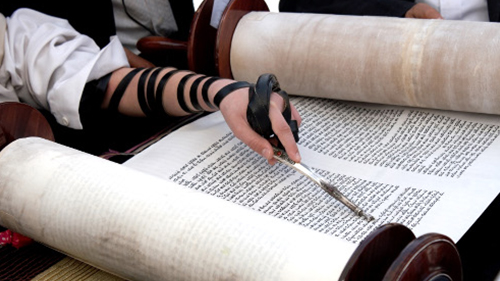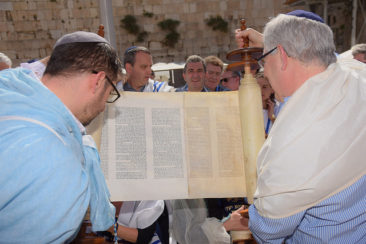The reconciliation between Yosef and his brothers is one of the most eloquent scenes, not just of the Bible, but of all World literature.
Let’s review the facts. After having children with Leah and the 2 concubines, Yaakov finally has a son with his beloved Rachel, who he obviously spoils and overprotects above his brothers. Young Yosef begins to have dreams of greatness, which he tells to his brothers, and as such he wins their hatred.
One day Yaakov sends Yosef to look for his brothers who were delayed. Upon seeing him, they throw him in a well and want to kill him, but in the end they decide not to spill his blood themselves and instead sell him as a slave. They take the special coat that Yaakov had given only to him, stain it with blood, and go and tell Yaakov that Yosef was killed by a beast.
Imagine the pain of the old patriarch!
But Jacob said, “No, I pray you; if you would do me this favor, accept from me this gift; for to see your face is like seeing the face of God and you have received me favorably.” (Gen. 33:10) Few narratives in the Bible have touched me as deeply as does the story of Jacob’s reconciliation with his brother, Esau, as recounted in this week’s parashah.
He had a dream; a stairway was set on the ground and its top reached to the sky. (Gen. 28:2)
Jacob’s dream at Bethel is one of the most famous in biblical literature. Although he envisions angels (Hebrew: Malachei Elohim—literally, “messengers of God”), the text makes it clear that they only provide the setting, but that it is God who stands beside him and reiterates the promises made to his grandfather Abraham (Gen. 12:2) and his father, Isaac (Gen. 26:3-4), that his progeny will be prolific and “all the families of the earth shall bless themselves by you and your descendants.”
Were we to compare our patriarchs’ impact on Judaism, Isaac would be a distant third. First place is a tie between his father Abraham, the champion of faith and hospitality, and his son Jacob, the spiritual wrestler. Isaac’s problem lies in how few columns in the Torah are devoted to him. Other than having survived the trauma of the Akedah, the information in parashat Toldot, is basically it. Isaac is best summed up as his father’s son and his son’s father. Like Abraham, Isaac experiences a famine and has his wife taken by a king. Like Jacob, Isaac’s future wife is discovered at a well. Even in Toldot which begins: This is the story of Isaac, son of Abraham. Abraham begot Isaac, the focus shifts in the very next verse to what will develop as Jacob’s story rather than the tale of Isaac.
We are living in an age when the news is filled with demeaning language and accusations of impropriety in the workplace. Whether it is well-known newsmen, movie moguls or politicians, women are treated as objects and worse. Many of the men assume their positions of power will keep them safe and insulated from accusations. While women who speak their mind are threatened, ridiculed and in some cases fired. It does not matter where you live—North America, Israel or Europe –women are fighting for dignity and respect.
Noah was destined to be neither the father of the Jewish people nor the founder of our faith. Though the most righteous one in his corrupt generation, he failed to reach out and save human lives besides those of his family. Thus, the Rabbis who were aware of Noah’s disturbing limitations in the terse yet […]
One aspect of Torah study that I love is when our sages see something in the grammar of the Hebrew of the Torah itself that stands out to them as unusual. It might be a small and seemingly insignificant or trivial matter to the Hebrew reader like a vowel or letter that appears out of place in a sentence. It would not even get our attention in the English translation. Yet, for the rabbis who have laser-like focus on the Hebrew text, they immediately presume that there are no accidents of grammar. They always believe that there is a hidden meaning behind every letter and vowel in the Torah. The challenge is to figure out what is the hidden meaning.
After the days of Awe – the days of judgment and blot, forgiveness and repentance – come the days of celebration, the days of joy and of praise. After fasting, we rejoice in Sukkot as the Torah instructs us in Deuteronomy 16:15:
Seven days shall you keep a feast to the Lord your God in the place which the Lord shall choose; because the Lord your God shall bless you in all you increase, and in all the work of your hands, and you shall be altogether joyful…
The feast of Sukkot, of all our holidays, is the one is characterized by the idea of universalism.
As we approach Yom Kippur we say, G’mar hatimah tova… May it be a good ending, as we leave Yamim Noraim and begin the journey of a new year… But life teaches us new meanings to old words and sometimes our defects may teach us with our blessings cannot. Late one eve at the end […]
Then the telephone rang, and I heard the most heart-breaking news: the night before receiving some important examination results, the child of an old school friend had just taken their own life. When disease or adversity threaten our lives, we humans fight with such fortitude and tenacity. How could life have become so dreadful that this young person felt that the only way to deal with the pain was to make a permanent exit? How could they feel so alone and unheard? How could they choose death?



